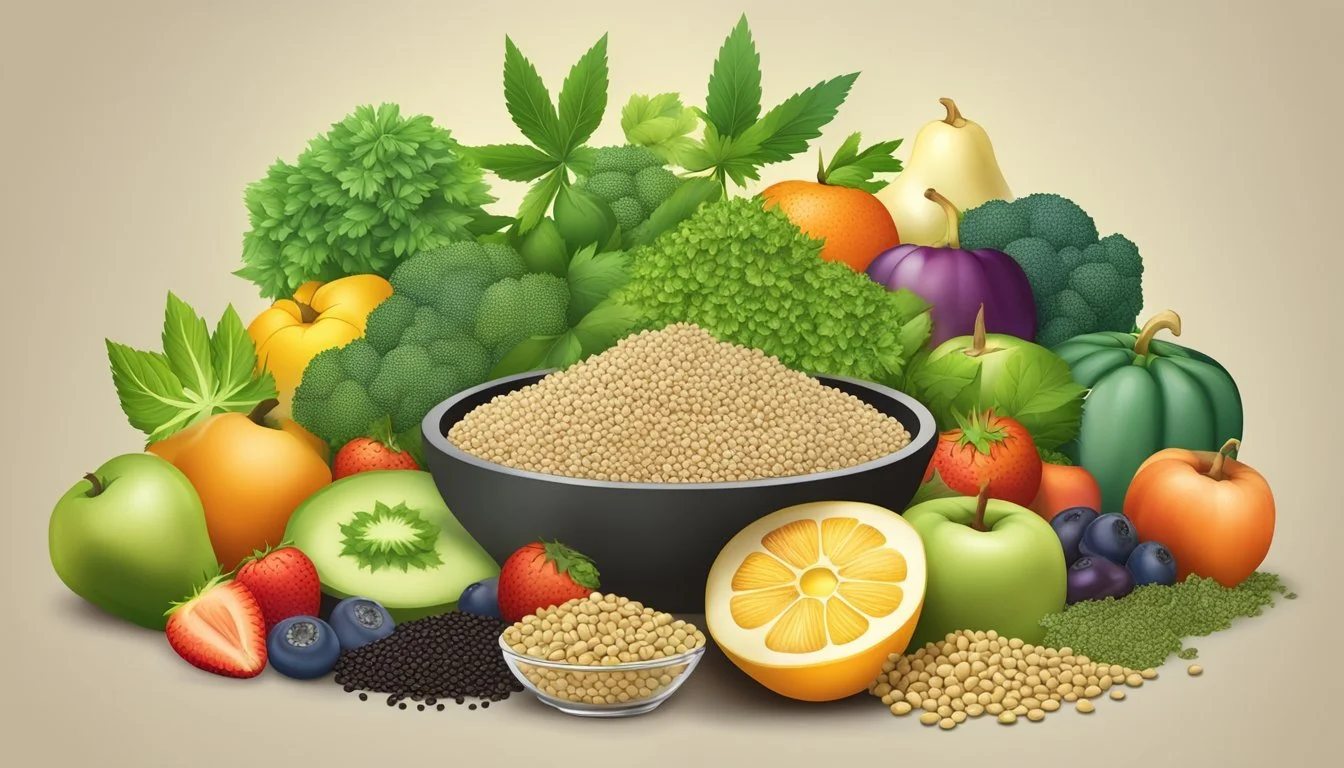What Are the Health Benefits of Hemp Seeds?
Unveiling Nutritional Advantages
Hemp seeds, the small yet mighty seeds from the Cannabis sativa plant, have secured their place as a powerhouse in the world of nutrition. Packed with a range of health-promoting properties, they are recognized for their high nutrient content. Offering more than just a complete protein source, these seeds are abundant in essential fatty acids, vitamins, and minerals, making them a nutritious addition to any diet.
The health benefits of hemp seeds are extensive, largely owing to their impressive profile of omega-3 and omega-6 fatty acids, which are crucial for maintaining heart health. These unsaturated fats help to support normal cardiovascular function and may lower the risk of heart disease. Additionally, hemp seeds contain a significant amount of arginine, an amino acid that plays a pivotal role in the production of nitric oxide, essential for artery and vein dilation and keeping blood vessel walls smooth and elastic.
Enriched with antioxidants and minerals such as phosphorus, potassium, magnesium, sulfur, calcium, iron, and zinc, hemp seeds contribute to overall well-being. Their high vitamin E content supports immune function and skin health, offering a protective shield against oxidative stress and inflammation. As a result, incorporating hemp seeds into one's diet can be a simple yet effective approach to enhancing health and preventing nutritional deficiencies.
Nutritional Composition of Hemp Seeds
Hemp seeds are renowned for their rich nutritional profile that includes a well-balanced mix of protein, essential fats, dietary fiber, as well as a variety of vitamins and minerals essential for the human body.
Protein and Amino Acids
Hemp seeds are a high-quality source of plant protein, containing all nine essential amino acids that the body cannot produce on its own. Specifically, they are a good source of arginine, an amino acid that is beneficial for heart health. On average, hemp seeds provide about 9.5 grams of protein per serving.
Fiber Content
The fiber content in hemp seeds can be attributed to their outer husk, which is high in insoluble fiber. When the husk is removed, the heart of the hemp seed still contains a considerable amount of fiber. Consuming hemp seeds can contribute to 1 gram of fiber per serving.
Fats and Fatty Acids
Hemp seeds are over 30% fat and rich in essential fatty acids, including omega-3 and omega-6 fatty acids. Omegas are found in a beneficial ratio that supports overall health. Notably, the omega-3 present in hemp seeds is in the form of alpha-linolenic acid (ALA), offering about 2.79 grams per serving.
Vitamins and Minerals
These seeds are a potent source of important minerals such as phosphorus, potassium, magnesium, sulfur, calcium, iron, and zinc. Additionally, they are an excellent source of vitamin E, a vital antioxidant that helps to protect the body's cells from damage.
Health Benefits of Hemp Seeds
Hemp seeds are recognized for their nutritional benefits, which extend across various aspects of health. These small seeds are a substantial source of essential fatty acids, antioxidants, and amino acids, contributing to the well-being of the heart, digestive system, skin, and immune functionality.
Heart Health and Cholesterol Control
Hemp seeds are a rich source of arginine, an amino acid that is beneficial for heart health as it can help to produce nitric oxide in the body. Nitric oxide is known to aid in the dilation and relaxation of blood vessels, leading to lower blood pressure and a reduced risk of heart disease. The presence of omega-3 and omega-6 fatty acids in hemp seeds can also promote the maintenance of healthy cholesterol levels.
Digestive Health
The high fiber content in both soluble and insoluble forms makes hemp seeds a supportive agent for digestive health. Soluble fiber forms a gel-like substance in the gut, associated with beneficial gut bacteria and may improve blood sugar and cholesterol levels. Insoluble fiber helps food and waste pass through the gut, contributing to regularity and preventing constipation.
Skin Health and Conditions
Individuals may find relief from skin conditions such as eczema and acne thanks to the omega-3 fatty acids in hemp seeds, which possess anti-inflammatory properties that can soothe the skin. The balance of omega-6 and omega-3 fatty acids in hemp seeds can also aid in reducing inflammation and may support the overall health of the skin.
Immune System Support
Hemp seeds contain numerous nutrients that are pivotal for a robust immune system, including omega fatty acids, antioxidants, and minerals like phosphorus, potassium, and magnesium. The antioxidant effects of vitamin E, found in hemp seeds, are crucial in protecting the body from oxidative stress and inflammation, which are significant contributors to immune health.
Incorporating Hemp Seeds into the Diet
Hemp seeds, known for their nutritional benefits, can be easily incorporated into daily meals to enhance their nutrient profile and introduce a subtle, nutty flavor.
Easy Additions to Meals
One can effortlessly integrate hemp seeds into their diet by sprinkling them over dishes. Hemp hearts, the shelled version of hemp seeds, are a versatile food item that can be added directly to salads or blended into smoothies for an extra boost of nutrients. They are particularly convenient as they don't require cooking. For a morning kick-start, one might consider sprinkling a tablespoon of hemp hearts on yogurt or cereal. Each tablespoon typically contains around 57 calories, which makes it an energy-rich addition to breakfasts with minimal caloric impact.
Salads: Add 1-2 tablespoons of hemp hearts.
Smoothies: Blend 2 tablespoons of hemp seeds with other ingredients.
Yogurt/Cereal: Top with a generous sprinkle of hemp seeds.
Cooking with Hemp Seeds
Hemp seeds can also contribute texture and nutrients to baked goods. When baking, they can be incorporated into bread, muffins, or other recipes, often in conjunction with other nuts for added richness and protein content. Hemp milk, made by blending hemp seeds with water, serves as a nutritious dairy-free milk alternative, which can be used in recipes or consumed directly. It is low in calories yet rich in high-quality plant protein and healthy fats. Additionally, hemp seed oil can be used as a base for salad dressings or light sautéing, though it should not be used for high-temperature cooking due to its low smoke point.
Baking: Mix hemp seeds into dough or batter for an added nutty taste and protein.
Hemp Milk: Blend soaked hemp seeds with water to create a creamy, non-dairy milk.
Dressings/Sauces: Use hemp seed oil as a base for homemade dressings.
Potential Considerations and Interactions
While hemp seeds are acknowledged for their nutrition and health benefits, it's crucial to understand their potential interactions with medications, the risk of allergies, and the regulatory aspects concerning their THC content.
Hemp Seeds and Medication Interactions
Hemp seeds contain compounds that may affect how the body metabolizes certain medications. Specifically, they could alter the activity of enzymes responsible for drug metabolism in the liver. Patients taking blood thinners or other prescription medications should consult their healthcare provider before incorporating hemp seeds into their diet, to prevent unexpected side effects or interactions.
Allergies and Intolerance
Although uncommon, some individuals may experience allergies to hemp seeds. Signs of an allergic reaction can include skin rashes, throat irritation, or gastrointestinal distress. If symptoms of an allergic reaction occur, one should discontinue the use of hemp seeds and seek medical advice. It's essential for individuals with a history of plant-based allergies to approach hemp seeds with caution.
Regulatory Aspects and THC Content
Hemp seeds are derived from Cannabis sativa, yet they should contain negligible amounts of THC (tetrahydrocannabinol), the psychoactive compound found in marijuana. Legally, the THC content in hemp products must not exceed 0.3% to ensure no psychoactive effects. Consumers should look for certified products that guarantee compliance with these regulations. This ensures the consumption of hemp seeds without the risks associated with THC.
Frequently Asked Questions
In this section, we explore common inquiries about hemp seeds and their numerous health benefits, offering precise and informed answers based on current knowledge and research findings.
What nutritional benefits do hemp seeds offer?
Hemp seeds are a rich source of essential fatty acids, including omega-3 and omega-6, and are also an excellent source of protein. They contain the amino acid arginine, which may benefit heart health, as well as important vitamins and minerals such as vitamin E, phosphorus, potassium, sodium, magnesium, sulfur, calcium, iron, and zinc.
Can regular consumption of hemp seeds improve overall health?
Yes, the regular intake of hemp seeds can contribute to overall health by providing essential nutrients and fatty acids that can support heart health, reduce inflammation, and potentially improve skin conditions due to their anti-inflammatory properties.
Are there any specific health conditions that contraindicate the use of hemp seeds?
While hemp seeds are generally considered safe, individuals with a hemp allergy should avoid them. It is always recommended to consult with a healthcare professional before adding a new food to the diet if one has an existing health condition.
How do hemp seeds impact cognitive function?
Research on hemp seeds’ impact on cognitive function is limited. However, omega-3 fatty acids present in hemp seeds are thought to support brain health, although more research is needed to draw concrete conclusions on cognitive improvements.
What potential side effects may occur from hemp seed consumption?
Consuming hemp seeds is generally safe; however, some individuals may experience mild side effects such as digestive discomfort if they are not used to a high-fiber diet. Starting with small quantities may help to minimize potential side effects.
How can hemp seeds be incorporated into a daily diet for maximum health benefits?
Hemp seeds can be easily added to a variety of dishes such as salads, smoothies, yogurts, and baked goods. They offer a nutty flavor and can also be consumed raw or toasted for increased texture and taste in meals.



